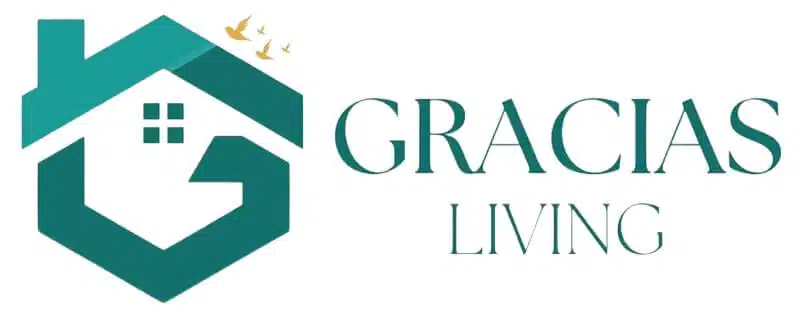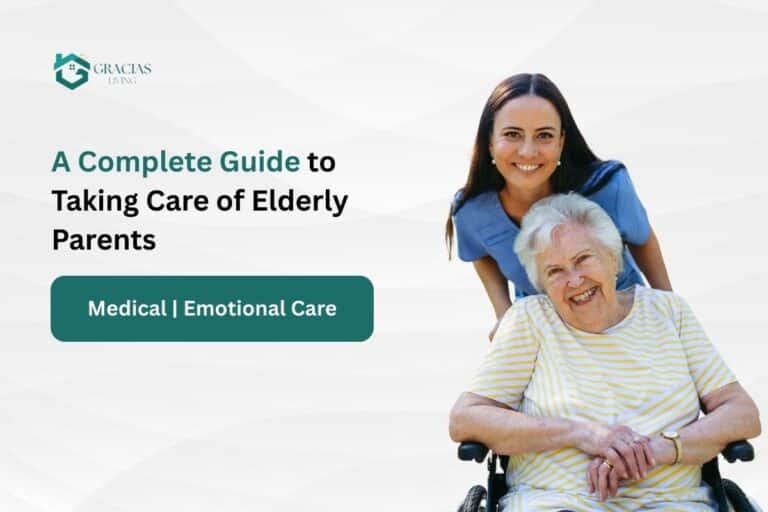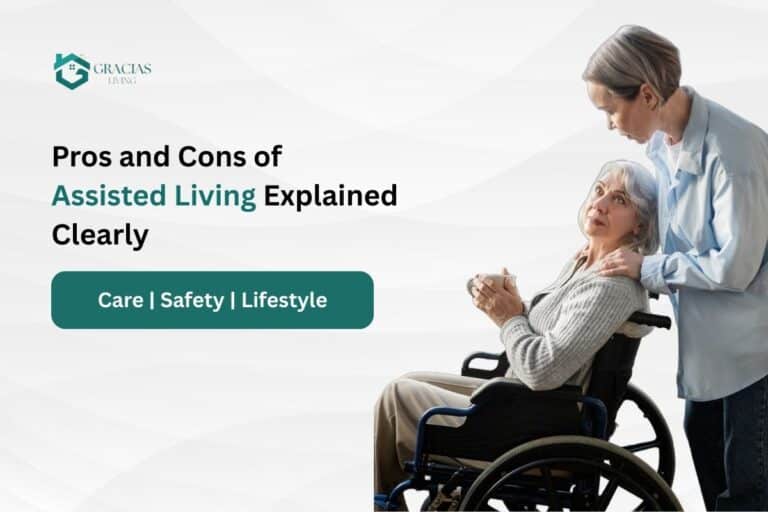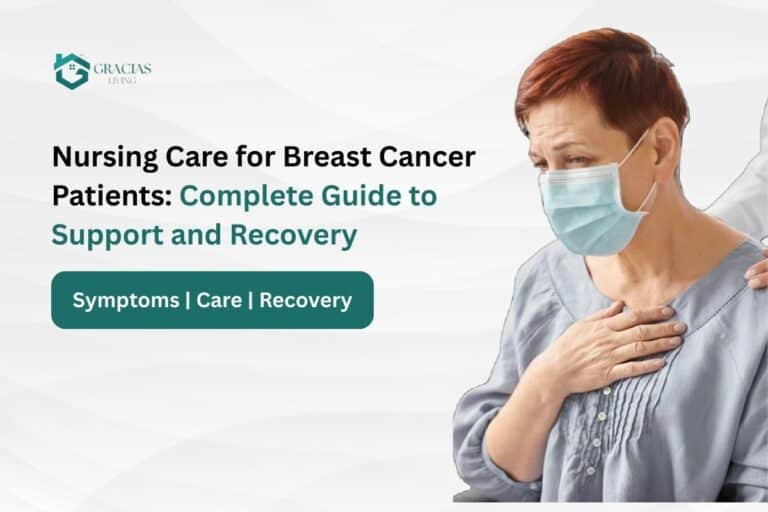Quick Summary of the article:
- Assisted living vs. in-home care: Families prefer assisted living for better care, safety, and community.
- 24/7 medical support: Gracias Living offers continuous care, ensuring immediate help during emergencies.
- Social engagement: Daily activities prevent isolation and boost seniors’ mental health.
- Senior-friendly facilities: Our spaces are designed for safety and accessibility.
- Family peace of mind: Gracias Living ensures seniors live happily, safely, and with dignity.
More Indian families are choosing assisted living for their ageing parents instead of home care. Why?
Assisted living offers safer spaces, 24/7 medical support, and a joyful community.
Caring for an ageing parent is a big responsibility. Many families start with in-home care, hoping it will be enough.
But over time, they face problems—like medical emergencies, loneliness, and lack of routine. That’s why more families are now choosing assisted living communities.
At Gracias Living, seniors get a safe, happy life with friends, activities, and round-the-clock support. This blog shares the 7 key reasons assisted living is becoming the better, kinder choice for senior care in India.
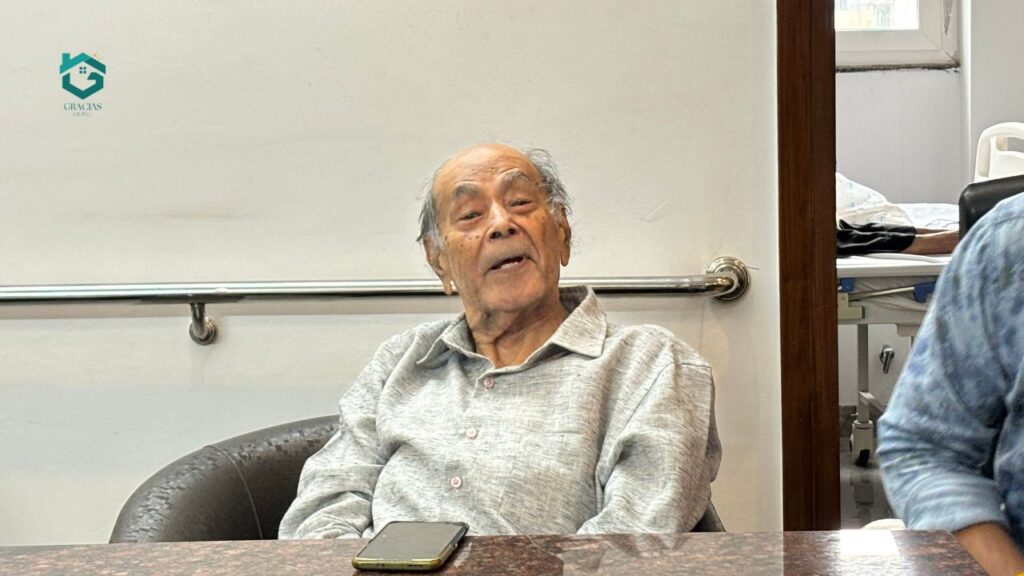
Differences between residential facilities and in-home support
Assisted Living entails the provision of these they would stay in a residential community where seniors would move to a senior-friendly apartment or suite. The facility provides an inbuilt community unit and ease of accessing facilities, which makes it a social ecosystem against isolation.
Conversely, Home Care comes with professional caregivers in the residential premises of the seniors, and hence, the seniors are enabled to work in a place known to them.
One of them is a significant difference in safety and scope of care. Dennis falls are minimised through assisted living facilities that have infrastructure that is elder-friendly, such as grab rails, emergency call systems, and non-slip floors.
They also introduce 24/7 on-site staffing as well as emergency medical cover. The usual types of in-home care include part-time or dedicated, but the home as a residence can be unsafe, and emergency services are external.
Genuine procedure of regular meals, socialisation, and intellectual stimulation is guaranteed in Assisted Living. Facility residents have several residents under the care of the staff of each shift.
Home Care, on the other hand, ensures excellent attention is given at 1 on 1 level in terms of isolated attention given to the needs and preferences of the individual. Home care might also lack the strong social and medical support accorded to a residential centre, whereas home care is very personal.
Why Families Choose Assisted Living Over In-Home Care
In Indian culture, caring for our elders is not just tradition—it’s a sacred duty.
But as lifestyles shift and nuclear families become the norm, many adult children, especially those living abroad or juggling demanding careers, are faced with a difficult decision: how do we ensure our ageing parents receive the care, safety, and dignity they truly deserve?
While in-home caregiving may seem ideal at first, families often discover it has hidden limitations—from inconsistent support to social isolation for the senior.
Let’s explore why more families are making the switch—and why this choice is a gift to start something new and better and Why Gracias Living is a best choice for your ageing parents.
1. 24/7 Medical Support – No More Middle-of-the-Night Emergencies
One of the biggest stressors for families providing in-home care is emergency management.
Most caregivers are part-time, and even full-time nurses may lack the training or equipment to handle sudden medical situations.
At Gracias Living, our residents are monitored round-the-clock by trained nursing staff. Emergency medical response systems are integrated into each room, and we have on-call doctors and partnerships with top hospitals in Gurgaon. So, whether it’s a minor fall or a major health alert, help is always seconds away.
Peace of mind isn’t a luxury. It’s a basic need, especially when it comes to your parents’ health.
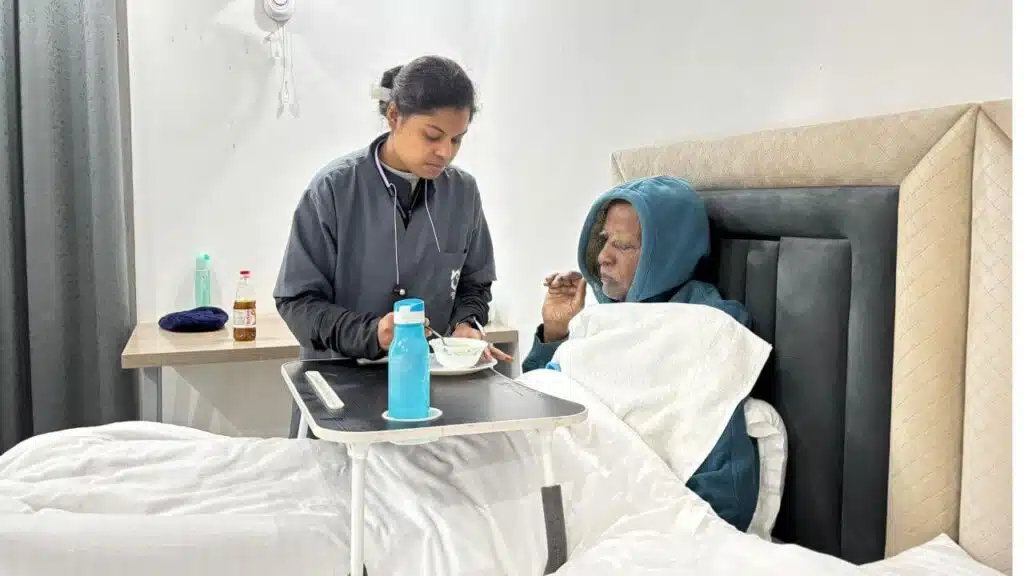
2. Social Engagement – Because Companionship Heals
In-home care often leads to emotional isolation, especially for seniors who no longer have regular visitors or stimulating conversation. Loneliness can silently escalate into depression or cognitive decline.
Gracias Living provides a built-in social ecosystem. Whether it’s celebrating festivals, enjoying chai with peers, participating in musical evenings, or taking part in group yoga sessions—our residents are part of a thriving, joyful community.
“Since moving to Gracias, my father smiles more. He calls it his ‘new beginning’.” – Priya M., Daughter of a resident
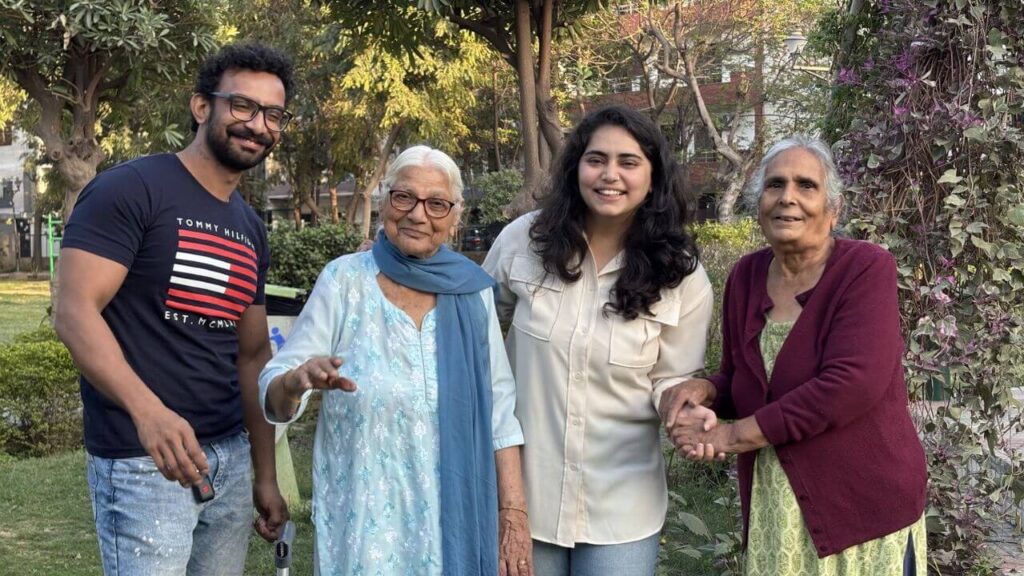
3. Elder-Friendly Infrastructure—Designed for Safety
Our traditional homes, no matter how loving, often aren’t physically safe for ageing adults. Stairs, uneven floors, poor lighting, and inaccessible bathrooms can become daily hazards.
Gracias Living is architecturally designed with senior safety and mobility in mind:
- Safety and Security
- Wide corridors with grab rails
- Elevator access
- Emergency call buttons
- Wheelchair-friendly pathways
Every detail is built to support independent but secure living.
4. Consistent Nutrition & Medication Management
At home, seniors may skip meals, rely on quick fixes, or eat unmonitored diets. Medication doses may be missed or doubled accidentally.
Our in-house culinary team, in consultation with nutritionists, creates balanced, age-appropriate meals, factoring in medical conditions like diabetes, hypertension, or recovery diets. Medications are dispensed and recorded systematically, ensuring 100% compliance.
A healthy body begins with the right food and the right routine. We provide both—with love.
5. Cognitive & Physical Stimulation—A Daily Routine That Uplifts
In-home caregiving rarely provides structured engagement. Seniors may spend their days idle, leading to mental decline and loss of purpose.
At Gracias Living, residents follow a dynamic schedule of:
- Brain games
- Music therapy
- Story circles
- Art sessions
- Nature walks
- Physiotherapy and light exercise
Our programs are designed not just to fill time, but to enrich lives. Families can also explore thoughtful gift ideas to make each day even more special.
6. Support for Dementia, Alzheimer’s & Post-Operative Recovery
In-home care for seniors with cognitive or mobility challenges requires specialised skills—often unavailable locally.
Gracias Living offers:
- Specialised dementia care units
- Trained memory-care staff
- Occupational therapy
- Post-operative nursing with rehab
- Emotional support for families
Whether your parent is recovering from surgery or facing cognitive decline, we provide an environment of respect, understanding, and clinical excellence.
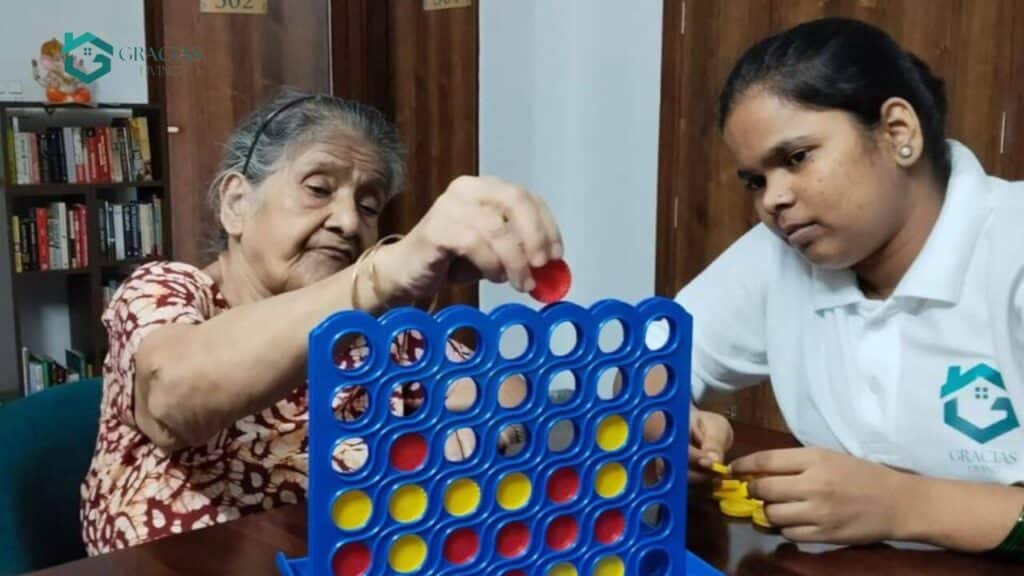
7. Transparency, Tech & Trust—Especially for NRIs
Many families live abroad or in other cities. They worry about being out of touch with their parents’ care and daily life.
Gracias Living offers:
- Weekly digital updates to families
- Scheduled video calls
- Digital health records & medication logs
- Open communication with our Care Managers
Distance doesn’t mean disconnect. With us, you’re always in the loop.
Comparison of the Cost of Assisted Living and Home Care
These two types of care have a major difference in their financial structure. Assisted Living is more expensive in terms of the collective cost, as it tends to be accompanied by an initial deposit.
This fee takes into account lodging, utilities, meals, amenities (including social clubs and other fitness centres), and care services, all on one monthly fee; regardless of whether the senior will use all services or not.
Home Care provides improved cost flexibility. The only time that the families pay is for the number of hours of service required (e.g., morning and evenings). In case the care should only be taken several times a week, the cost of the home care is usually lower than the total monthly cost of assisted living.
Nevertheless, when the elderly citizen needs almost 24-hour attention, the expenses of home care might rapidly increase and surpass the cost of an inpatient establishment.
Choosing Care Is Not Abandonment. It’s Empowerment.
It’s common to feel guilt when transitioning a loved one into assisted living. But choosing Gracias Living means:
- Giving them dignity, independence, and joy
- Ensuring medical safety and emotional warmth
- Offering them a second home, not a hospital
At Gracias Living in Gurgaon, we turn family worries into peace of mind. Many families begin this journey with doubts, unsure if assisted living suits their ageing parents. But once they step into our community and experience the warmth, care, and safety we offer, their hesitation fades.
We’ve guided dozens of families through this transition. We listen with empathy, answer their questions with honesty, and explain every detail with full transparency.
Each time, we watch a tough decision turn into relief—and often, unexpected joy. Seniors settle in with ease, build friendships, enjoy a healthy routine, and rediscover purpose in daily life. Their families feel comforted knowing their loved ones live in a space that’s not only safe but also filled with life and care.
At Gracias Living, we don’t just provide assisted living—we create a vibrant, loving environment where seniors thrive with dignity, respect, and human connection.
Final Thoughts
Choosing between in-home care and assisted living can feel challenging. But when families ask what their ageing parents truly need—safety, connection, respect, and joy—they often find clarity.
At Gracias Living, we build a second home where seniors feel seen, heard, and cherished every day. We create an environment filled with love, purpose, and professional support. Families trust us because we stay by their side, answer every question, and deliver on every promise.
We celebrate our seniors. We honour their stories. And we give their families the comfort of knowing their loved ones live in a place that puts heart into healthcare.
If you’re exploring assisted living options, we invite you to visit Gracias Living. Walk through our spaces, meet our people, and feel the energy that sets us apart. Often, one visit is all it takes to know you’ve made the right choice.
Frequently Asked Questions
1. In what ways do families opt for assisted living as compared to in-home care?
Assisted living often reflects in families and their preference to them as they include 24/7 medical care, integrated social services, organised cognitive activities and the safety aspects that elderly homes have not provided.
2. Isn’t assisted living more costly than it is in-home care?
Assisted living tends to be more expensive in terms of its fixed monthly payment that includes the room, the board, and the amenities. Home care would be cheaper than assisted living in limited need cases, but a higher cost compared to assisted living would be seen when full-time assistance of 24-hour round-the-clock care is necessary.
3. What kind of care would be provided in assisted living?
Assisted living offers assistance with Activities of Daily Living (ADLs), which include opportunities to provide laboratory work, such as dressing, bathing, and medications. It also provides specific nutrition, social and physical activity support.
4. Would assisted living be appropriate with a dementia patient?
Yes, a significant number of assisted care homes provide a Specialised Memory Care Unit. Such departments are built exposing upgraded security, and the personnel are filled with proficient human resources that were trained to maintain the focus on cognitive deterioration that would offer a safer environment.
5. What are the nature of the services that are usually offered under home care?
Home care normally involves the provision of non-medical aid on the ADLs, slight housekeeping, laundry, food preparation, transportation, running of errands and companionship services all in the home of the senior.
